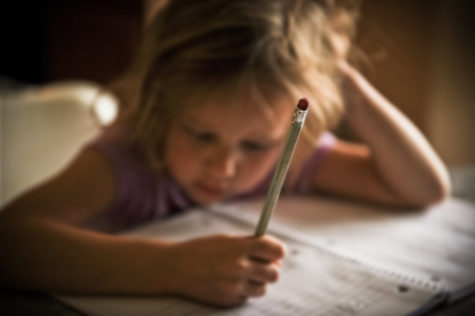






Less Homework = More Learning
My kids’ public school released kids from homework a few years ago — a move met with some pushback. As the NY Daily News put it: Parents Outraged After Principal Dumps Homework for more Playtime.
.
As if only the time spent bending over worksheets is learning! Prof. Peter Gray, author of Free to Learn, explains on the site Aeon:
.
Learning, according to that almost automatic view, is what children do in school and, maybe, in other adult-directed activities. Playing is, at best, a refreshing break from learning. From that view, summer vacation is just a long recess, perhaps longer than necessary. But here’s an alternative view, which should be obvious but apparently is not: playing is learning. At play, children learn the most important of life’s lessons, the ones that cannot be taught in school. To learn these lessons well, children need lots of play — lots and lots of it, without interference from adults.
So I thank Lynn Collins, M.Ed., ET/P, for sending us the essay below. Lynn has spent the past 20 years in education, as a teacher, an educational therapist, and a home school mom. She currently works as an education consultant.
Why Homework Is Not the Answer, and What Is
by Lynn Collins
I once believed that, through homework, my child would learn more and, therefore, achieve more academically. If he became a high achiever, he would later gain admission to a great college. He would be set up for a successful and happy life..Over the course of my 20 years as a teacher and parent of two, I have come to see things very differently..Homework does not lead to greater achievement, in school or in life..Why Homework is Not the Answer.First, homework kills that natural desire to learn that kids are born with. Our children spend 6-7 hours in school every day where they engage in multiple lessons and assignments, and then we give them take-home work. We want our kids to work hard and achieve, yet we overload them with work until they no longer enjoy school, and learning becomes “lame,” or overwhelming. This school burn-out is the antithesis to curiosity. And burn-out does not lead to school success..Alfie Kohn, a widely popular writer and lecturer on education, summed it up by saying, “Homework may be the greatest extinguisher of curiosity ever invented.”.Second, hundreds of research studies, hundreds, do not support homework. According to Denise Pope, senior lecturer at the Stanford University Graduate School of Education and author of Overloaded and Underprepared: Strategies for Stronger Schools and Healthy, Successful Kids, “The research clearly shows [at the elementary level] that there is no correlation between academic achievement and homework, especially in the lower grades.” A small correlation exists between homework and achievement in middle school, and only two hours is supported by research at the high school level..Interestingly, a study from Penn State University, conducted by researchers Gerald LeTendre and David Baker, showed that students in high performing countries like Japan, Denmark, and the Czech Republic are given less homework than students in the United States. Students with the lowest scores came from countries like Iran, Greece, and Thailand, where large amounts of homework were given..The research condemning homework goes on and on..Homework often impacts sleep. After a long school day, an activity, and dinner, children often take longer to finish their work than they do in school, as they’re tired from the long day; thus, they go to bed later, losing precious sleep, which is backed up by research as a necessary component to learning..“When we are sleep deprived, our focus, attention, and vigilance drift, making it more difficult to receive information,” wrote the researchers at the Division of Sleep Medicine at Harvard Medical School. “Without adequate sleep and rest, over-worked neurons can no longer function to coordinate information properly, and we lose our ability to access previously learned information.”.Additionally, families often disagree and argue over homework, leading to great stress at home. The parent becomes the teacher (without credentials) and is expected to know the methods the teacher used in class, an unfair burden to place on parents. Children deal with the burden of their parents’ disappointment when they don’t understand a concept. Evenings should not be a stressful time for families but, rather, a chance to bond..Finally, kids who struggle in school spend so much time simply getting through the homework that there is no time left to work on the basic skills they need. How are these kids expected to achieve if they have no time to master the basics?.What IS the Answer?.How about learning in other ways? Learning from a teacher who is credentialed and knowledgeable is wonderful, and worksheets can help students work toward mastering the material, but traditional schooling shouldn’t be the only way our kids learn. How about an activity that is backed up by research: nightly reading. Kids can also learn by watching interesting documentaries, doing math through cooking and grocery shopping with a parent, playing Scrabble, going to museums, and so on. By learning in other ways, our children will use their brain in new ways, and they will see that learning is not just something that happens inside a classroom..How about giving them some down-time after school, or after their activity, so they can recover mentally from the long day? If our kids go to school refreshed rather than stressed every day, their natural curiosity will return and they will have more mental energy to learn. By protecting that down-time for your kids, you’re also giving them time to think for themselves and discover who they are, rather than being robots who do as they are told from morning until night..How about having them do chores? According to the Harvard Grant Study, the longest longitudinal study of humans ever conducted, the number one predictor of professional success in life is having done chores as a child. By helping out around the house, children feel that they are contributing to their family. This translates to an attitude of, “How can I contribute to the group,” as an adult rather than an attitude of, “What can I do for myself?”.How about changing what homework looks like to reignite that natural desire to learn? Professionals on both sides of the issue agree on the importance of nightly reading. With a reading-only homework policy, kids would actually have time to do the reading and would enjoy it rather than squeezing their mandatory minutes into a packed schedule. A reading-only homework policy would also allow time for kids who struggle to work on their basic skills..Vicki Abeles, education advocate and creator of, “Race to Nowhere,” a powerful documentary on our high-pressure education system and what it is doing to our children, created guidelines, with her team (a lawyer, a professor, and an education advocate), for what homework should be, if assigned at all. Their guidelines include: project-based, student-led work within the student’s interests, experiences “that cannot be had within the confines of the school setting or school day,” and assignments that “advance a spirit of learning, curiosity, and inquiry among students.”.Many educators and entire schools across the country have abolished homework with great success. Others are hesitant, often because the parents still demand homework without understanding the issue. If we don’t make a change now, our children will pay the price later. Please go to your child’s teachers and principal and share your thoughts on this crucial issue.
.Freedom in learning, rather than traditional homework, will bring back our kids’ natural desire to learn, setting them up for greater achievement and fulfillment, both in school and later in life..
.




What happened to Japan? As a teen, the US was scared not just of Japan’s economic prowess, output, but for supposedly way superior education? Was this just a false presumption based on false doctrine?
No homework or just reading sounds great to me. It has seemed to me kids were getting assigned work they COULD NOT DO. Even 20 years ago, much seemed to me to be homework designed for parents to do with their kids. Heartbreaking! Kids from impoverished families, with working parents, no adequate child care; or whose parents didn’t go to college, are already mighty disadvantaged. Besides not getting their homework done, such kids could grow ashamed of their parents, or worse, feel unloved. Wrongfully IMO.